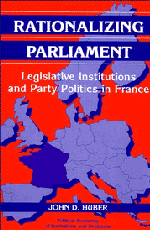Book contents
- Frontmatter
- Contents
- Series editors' preface
- Acknowledgments
- Introduction
- Chapter 1 Parliamentary government in the Fifth Republic
- Chapter 2 Choosing institutions
- Chapter 3 Restrictive procedures and policy conflict
- Chapter 4 Restrictive procedures and bargaining among parties
- Chapter 5 The confidence vote procedure and electoral politics
- Chapter 6 Electoral politics, procedural choice, and the French budget
- CHAPTER 7 Institutional arrangements, political parties, and parliamentary democracy
- Notes
- References
- Index
Series editors' preface
Published online by Cambridge University Press: 05 December 2011
- Frontmatter
- Contents
- Series editors' preface
- Acknowledgments
- Introduction
- Chapter 1 Parliamentary government in the Fifth Republic
- Chapter 2 Choosing institutions
- Chapter 3 Restrictive procedures and policy conflict
- Chapter 4 Restrictive procedures and bargaining among parties
- Chapter 5 The confidence vote procedure and electoral politics
- Chapter 6 Electoral politics, procedural choice, and the French budget
- CHAPTER 7 Institutional arrangements, political parties, and parliamentary democracy
- Notes
- References
- Index
Summary
The Cambridge series on the Political Economy of Institutions and Decisions is built around attempts to answer two central questions: How do institutions evolve in response to individual incentives, strategies, and choices, and how do institutions affect the performance of political and economic systems? The scope of the series is comparative and historical rather than international or specifically American, and the focus is positive rather than normative.
John Huber's original, imaginative book develops and tests theories about how institutional arrangements shape political decision making. He provides innovative game-theoretic arguments about how legislative procedures, through their impact on the bargaining strategies of political parties, influence policy outcomes, cabinet stability, and political accountability in France. Bringing together often-separated models of strategic bargaining and legislative behavior, he argues that most policy conflict in parliamentary systems is not between the cabinet and parliament but between different parties or factions within the government majority or between government and opposition parties during minority governments. He examines two institutional arrangements for resolving such conflicts, the ‘package vote’ and the ‘confidence vote procedure,’ both significant elements of politics and policy outcomes in the French National Assembly. He concludes that such procedures are less ‘antidemocratic’ than is often suggested. Neither the package vote nor the confidence vote procedure is used by the government to run roughshod over the National Assembly. Instead, the package vote is used by party leaders in government to preserve essential elements of policy bargains struck outside the legislature.
- Type
- Chapter
- Information
- Rationalizing ParliamentLegislative Institutions and Party Politics in France, pp. ix - xPublisher: Cambridge University PressPrint publication year: 1996

